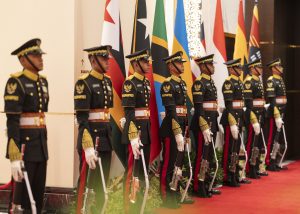As Indonesia approaches the 70th anniversary of the Bandung Conference in 2025, President Prabowo Subianto’s early signals suggest a significant recalibration of Indonesia’s engagement with Africa. In his first major international policy statement, published in Newsweek in June, Prabowo explicitly highlighted Africa as a “special focus,” describing it as “a continent close to my heart.”
Prabowo’s intellectual affinity for the realist approach of Professor John Mearsheimer, whom he praised and invited to brief his cabinet in October, suggests a potential departure from traditional Indonesian approaches to Africa, which has historically emphasized solidarity principles and South-South cooperation rooted in the Bandung spirit. While his party Gerindra’s manifesto criticizes the Non-Aligned Movement as obsolete, his public statements express support for Global South solidarity, particularly regarding Palestine. This balanced approach was evident in Prabowo’s inaugural address, in which he strongly affirmed Indonesia’s support for Palestinian independence, demonstrating the complex balance Prabowo must maintain between strategic interests and historical commitments.
During his tenure as defense minister (2019-2024), Prabowo oversaw some initial defense engagements with Africa, including the delivery of an Indonesian-made CN235-220 MPA aircraft to the Senegalese Air Force in March 2021. Now as president, he has announced scheduled visits from several African leaders in early 2025, including Angolan President João Lourenço in January and Congolese President Felix Tshisekedi in February, with Tanzania’s President Samia Suluhu Hassan also expressing interest in a state visit.
Indonesia’s engagement with Africa has transformed significantly since the 1955 Bandung Conference. While Sukarno emphasized ideological solidarity and Suharto focused on economic pragmatism, subsequent presidents struggled to find a balanced approach to the Global South. The New Asian-African Strategic Partnership, launched in 2005, attempted to revitalize these relations but faced challenges due to competing priorities between the co-chairs, Indonesia and South Africa. Under President Joko Widodo, Indonesia adopted a more economic-focused approach, culminating in the establishment of the Indonesia-Africa Forum (IAF) as a key platform for engagement.
The September 2024 IAF marked a crucial transition point in Indonesia-Africa relations, revealing both the challenges and opportunities that exist in the relationship. The current $13.7 billion Indonesia-Africa trade relationship, while modest compared to China’s dominant position ($282 billion, and Africa’s largest trading partner for 15 consecutive years) and India’s established presence ($83 billion), shows potential for growth. The forum featured participation from 16 leading Indonesian state-owned and private enterprises across strategic industries, healthcare, and renewable energy sectors, a sign of serious commitment to deepening economic engagement.
Defense cooperation emerged as a unique aspect of Indonesia’s Africa engagement under Prabowo. Beyond the CN235-220 MPA aircraft delivery to Senegal, Indonesia’s defense industry has shown interest in various African markets. As defense minister, Prabowo initiated discussions about potential sales of military equipment and training programs with several African nations. This defense-industrial cooperation could serve as a foundation for broader economic and strategic partnerships, particularly in regions where security cooperation aligns with economic development goals.
The potential for an ASEAN-Africa framework represents a novel approach to addressing Indonesia’s resource limitations. While Indonesia cannot individually match China or India’s economic engagement, coordinated ASEAN initiatives could create more substantial partnerships. Indonesia’s economic weight within ASEAN, combined with its historical role in South-South cooperation, positions it well to advocate for stronger ASEAN-Africa engagement. This regional approach could differentiate Indonesia’s Africa strategy from the bilateral focus of other major Asian powers, potentially offering African partners an alternative model of economic cooperation.
Over time, Indonesia’s development cooperation with Africa has grown more concrete, exemplified by the establishment of East Africa’s first ICU facility at East Africa University Hospital in Puntland, Somalia on November 28 of this year. This pioneering project, implemented through collaboration between Indonesia AID, the Islamic Development Bank, and Egypt’s Ain Shams University Virtual Hospital, includes modern infrastructure, telemedicine capabilities, and medical staff capacity building.
The recent Memorandum of Cooperation with Japan’s JICA, signed on the sidelines of the 2nd IAF in early September, suggests a more collaborative approach, leveraging trilateral cooperation to enhance development impact. Indonesia AID’s expanding presence in Africa indicates potential for increased technical cooperation and knowledge sharing, particularly in sectors where Indonesia has demonstrated expertise such as agriculture, digital governance, and sustainable development. This approach aligns with African development priorities while leveraging Indonesia’s comparative advantages.
Indonesia’s positioning in Africa reflects broader geopolitical dynamics, where regional blocs are becoming increasingly important in international relations. Under Prabowo’s leadership, Indonesia appears to be pursuing a strategy that leverages ASEAN’s collective weight rather than competing individually with major powers in Africa. This strategic innovation in South-South relations could position ASEAN as a “third way” for African partners, distinct from China’s infrastructure-led development or Western aid models.
Moreover, this regional approach could prove attractive to African nations seeking to diversify their international partnerships beyond traditional major power relationships. An ASEAN-Africa framework would offer African countries access to a diverse range of development experiences and economic opportunities while avoiding overdependence on any single external power. For Indonesia, leading this initiative would reinforce its position as a key architect of South-South cooperation while sharing the financial and diplomatic burdens of African engagement with its ASEAN partners.
Looking ahead, the 70th anniversary of the Bandung Conference provides Prabowo an opportunity to articulate a coherent Africa strategy that bridges Indonesia’s historical role with contemporary realities. Success will require harmonizing multiple objectives: leveraging defense cooperation for economic gains, balancing pragmatic interests with Global South solidarity, and coordinating regional frameworks while deepening bilateral partnerships. In an increasingly multipolar world, Indonesia’s ability to offer African partners a distinct model of cooperation, and a third way between contending power blocs, could help define Prabowo’s foreign policy legacy.

































